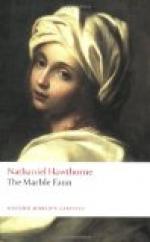“It is a most enchanting fable!” exclaimed Kenyon; “that is, if it be not a fact.”
“And why not a fact?” said the simple Donatello. “There is, likewise, another sweet old story connected with this spot. But, now that I remember it, it seems to me more sad than sweet, though formerly the sorrow, in which it closes, did not so much impress me. If I had the gift of tale-telling, this one would be sure to interest you mightily.”
“Pray tell it,” said Kenyon; “no matter whether well or ill. These wild legends have often the most powerful charm when least artfully told.”
So the young Count narrated a myth of one of his Progenitors,—he might have lived a century ago, or a thousand years, or before the Christian epoch, for anything that Donatello knew to the contrary,—who had made acquaintance with a fair creature belonging to this fountain. Whether woman or sprite was a mystery, as was all else about her, except that her life and soul were somehow interfused throughout the gushing water. She was a fresh, cool, dewy thing, sunny and shadowy, full of pleasant little mischiefs, fitful and changeable with the whim of the moment, but yet as constant as her native stream, which kept the same gush and flow forever, while marble crumbled over and around it. The fountain woman loved the youth,—a knight, as Donatello called him,—for, according to the legend, his race was akin to hers. At least, whether kin or no, there had been friendship and sympathy of old betwixt an ancestor of his, with furry ears, and the long-lived lady of the fountain. And, after all those ages, she was still as young as a May morning, and as frolicsome as a bird upon a tree, or a breeze that makes merry with the leaves.
She taught him how to call her from her pebbly source, and they spent many a happy hour together, more especially in the fervor of the summer days. For often as he sat waiting for her by the margin of the spring, she would suddenly fall down around him in a shower of sunny raindrops, with a rainbow glancing through them, and forthwith gather herself up into the likeness of a beautiful girl, laughing—or was it the warble of the rill over the pebbles?—to see the youth’s amazement.
Thus, kind maiden that she was, the hot atmosphere became deliciously cool and fragrant for this favored knight; and, furthermore, when he knelt down to drink out of the spring, nothing was more common than for a pair of rosy lips to come up out of its little depths, and touch his mouth with the thrill of a sweet, cool, dewy kiss!
“It is a delightful story for the hot noon of your Tuscan summer,” observed the sculptor, at this point. “But the deportment of the watery lady must have had a most chilling influence in midwinter. Her lover would find it, very literally, a cold reception!”
“I suppose,” said Donatello rather sulkily, “you are making fun of the story. But I see nothing laughable in the thing itself, nor in what you say about it.”




